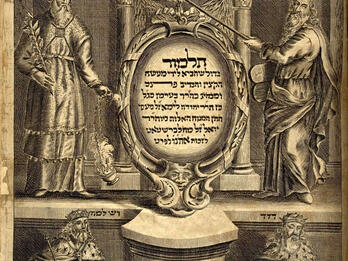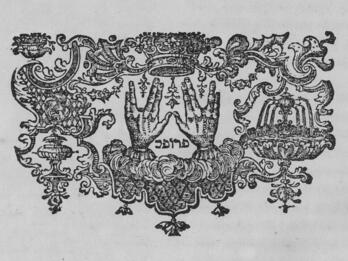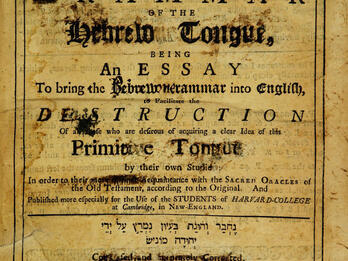Printer’s Preface: Tsene rene
God, blessed be He, knew very well that the people of Israel would be scattered among the nations and that most of them would not be able to understand the holy tongue [Hebrew]. Therefore our sages prepared books in Yiddish, the language of Ashkenaz (which they use in our generations to teach children), or in the language spoken by the people in every country where Jews live. Therefore many works about Torah and piety have been written in Yiddish, for example, Sefer lev tov [The Book of a Good Heart] or Brantspigel [The Burning Mirror, by Moses Yerushalmi, 1596] and other books. And likewise, the Tsene rene, which is the most easily accessible for those householders (men) who are not learned as well as for married women, youths, and maidens. For this reason, I want to explain what led me to print books such as these, as I have already published Sefer lev tov and Tsene rene: many people have told me on numerous occasions that these books are very useful for the simple folk, yet their language is not good and they are full of mistakes. I thus decided to perform willingly the mitzvah for the benefit of the general public. However, it was not in my power to carry out this task, since I was not able to print even one sheet on my own account. Then a group of men and women, youths, and maidens, numbering around two hundred in total, may God lengthen their days, joined together and helped me faithfully publish these books and purchased from me pamphlet after pamphlet, paying me immediately, and with this money I was able, thank God, to bring the books to completion. May God merit them to see sons and grandsons and may they raise them to the Torah, the marriage canopy, and good deeds. Amen.
Although I saw that the Tsene rene has been printed a number of times and is still available for sale, I undertook this project because I have read it many times during my life and I have not found its simple Yiddish language accurate. Just as when a Frenchman or a Spaniard wishes to speak German in the same way that he speaks his own language and does not know that each and every language has its own characteristics, so too in this way our books in Yiddish were printed. But if you read Sefer lev tov or Sefer ma‘ase ha-shem [The Book of the Deeds of the Lord] that were printed in Amsterdam, and likewise this version of Tsene rene, you will admit that I have acted correctly. These books were read with extreme care from beginning to end and were copied diligently and everything was checked appropriately before I handed them over to the printer. And for this reason, rabbis gave me approbations, as they saw that such great diligence was devoted to preparing the book. [ . . . ] Regarding mistakes, we also acted appropriately, even though it is impossible to print a book with no mistakes at all. But we did not behave as other printers who do not check carefully, whose main thing is that the letters are written black on white and that they are able to turn a profit. Not only do they [other printers] not make sure that the language is good, but the books are also full of mistakes. I saw one beautiful Tsene rene that was printed with illustrations. I did not find a single mistake in the illustrations, but above, below, and around them were many errors. I must admit that the printer acted with wisdom in supplying the illustrations, because they provide entertainment for children. Yet here in Amsterdam things are different. Good proofreading and excellent language, these are our illustrations. You can check the entire work and I am certain that you will not find in it the amount of mistakes that you find in four or five sheets of other books. [ . . . ] If they were to make a table of the mistakes [in the illustrated edition], they would need four sheets just for that. Therefore, I thank God, who assisted me and gave me the wisdom to produce this book, as everybody is able to see and reckon.
May God continue to assist me so that I can continue my work for the benefit of the public, as is my intention. [ . . . ] And all those who helped me with this book, may God repay them a thousand times over and may they be worthy to witness the comforting of Zion and the building of Jerusalem. And may the Holy One cause us to rejoice as we witness the building of the beautiful Temple, and may we be worthy to see the redemption and the Messiah son of David in his greatness soon, in our days, Amen, so may it be, so wishes your servant ḥayim ben Jacob, of blessed memory, Druker.
Credits
Published in: The Posen Library of Jewish Culture and Civilization, vol. 5.





